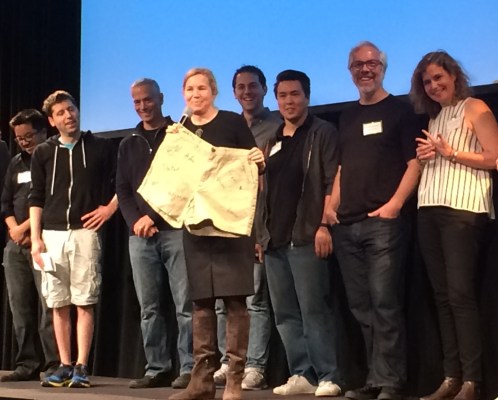Today’s Y Combinator Demo Day started a little differently. Co-founder Jessica Livingston presented YC’s former leader and her husband Paul Graham with a pair of his own shorts signed by all of this batch’s companies to commemorate Graham passing the torch on to new YC president Sam Altman. And then the pitching began.
68 companies will have presented by the end of today’s Demo Day to a crowd of salivating investors. Check out our review of batch one; below is a look at the second batch of 17 startups:
Zesty – Healthy Food Delivery
Zesty wants to beat Seamless GrubHub and other food-delivery services by trimming the fat. Literally. The service lets businesses and individuals order only the healthiest menu items from well-rated local restaurants. Users can see photos and calorie counts for everything Zesty sells. Its in-house dieticians even work with restaurants to make their cooking practices healthier.
Zesty will have to beat established incumbents, as well as new food startups like SpoonRocket, Munchery, and Sprig, but its revenue grew 25X this year to a $2.5 million a year run rate. Here’s how the business model works. It costs Zesty about $500 to sign up a large business customer, who will then spend $100,000 a year, netting Zesty $15,000 from its 15 percent commission. That means it pays back its customer acquisition cost in just 12 days. As businesses compete for talent, having healthy, tasty food like Google is a huge talking point. Plus, healthy foods leads to productive employees. Read more from TechCrunch about Zesty.
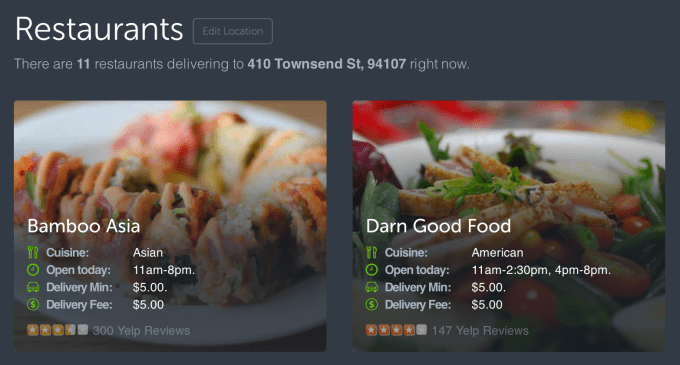
42: Understand offline POS data 
Analytical software for online purchases isn’t hard to find. 42 wants to build similar tools for offline sales, which make up 93 percent of total retail sales.
The company has already locked down a few high-profile clients. 42 charges per store per month, with a $10,000 price tag quoted by the company. Essentially, 42 is bringing sales-facing analytics SaaS to the rest of the world that hasn’t yet moved online.
Vidpresso – Replacing TV Station Hardware With Software
TV broadcasters currently use racks of expensive, single-purpose hardware to run their on-screen graphics, tickers and ads. That’s because software was too unreliable. But Vidpresso’s $500 a month software can run off a cheap Mac Mini, saving stations tons of money. CNN already used Vidpresso to power its social media ticker during its New Year’s Eve broadcast, has other clients around the world, and is growing 26 percent per month. Vidpresso sees software eating hardware and wants to do the same for the television industry. Read more from TechCrunch about Vidpresso.

StyleLend: Lend and borrow fashion items with other locals![]()
Fashion is expensive, so StyleLend wants to make it affordable. The company helps local people lend and borrow dresses from each other. It calls this monetizing the closet.
In the company’s estimation, there is $50 billion worth of fashion items in closets in the U.S. The service has grown 26 percent per week recently, though, only in San Francisco. Unlike Rent The Runway, StyleLend leans on an extant supply of items, limiting its cost structure.
The Dating Ring – Matchmaker-Assisted Online Dating
“Dating should work like Uber, and with The Dating Ring, it does,” says the startup’s co-founder. Currently, dating online is a big hassle. You sift through profiles or Tinder cards, approve some people, wait for a match, and make chit chat. If you’re lucky, it progresses to a real date, but then your partner might look nothing like your partner.
With The Dating Ring, you apply to join. Pass the first bar and you’ll meet in-person with a Dating Ring matchmaker for five minutes. They’ll assess your style and open the ability to go on group dates with three men and three women (or a group of four for gay users). But unlike Grouper, a matchmaker has ensured you’re more likely to fall for one of your date mates. Users pay $25 for the initial matchmaker meeting and $20 per date. The Dating Ring certainly made a stir when it announced plans to crowdfund planes full of women to be delivered from New York City to lonely San Francisco guys.
The Dating Ring’s revenue is growing 60 percent per month for the last six months, it’s profitable, and 70 percent of users go on a second date. While only $2 billion a year is spent in the space, The Dating Ring wants to grow the pie. It seems reasonable that people would be willing to pay for love…or at least to go on real, match-made dates instead of endlessly browsing profiles online. Read more from TechCrunch about The Dating Ring.

Unbabel: Human-cleaned machine translation 
Unbabel offers a fusion of machine and human translation that it claims can offer similar quality to human translation for 2 cents per word. That price point is five times lower than the industry standard, according to the company.
Unbabel translators — there are 4,400 so far — are five times as fast as human translators working without technological help. According to the company, translation is a $34 billion market, a figure that it thinks will grow now that translation is both cheaper and better.
 Pushbullet – Synced Cross-Web And Mobile Push Notifications
Pushbullet – Synced Cross-Web And Mobile Push Notifications
It’s crazy that when you’re at your computer, you still have to open your phone to look at push notifications. Pushbullet syncs them so you can respond on the device you’re currently using, including the web thanks to a Chrome/Firefox extension. You can even send files back and forth between your phone and computer. But Pushbullet also lets you turn changes on websites and more into push notifications, even if a site doesn’t have a mobile app. For example, you could ask to get an alert the next time Nike puts a new line of shoe on sale.
Pushbullet is now handling 10 million notifications a day for 100,000 weekly users and 60,000 daily users. Push is quickly becoming the most powerful way to reach people and is eating email’s lunch. Pushbullet could hit the bullseye by enhancing the standard and bringing it to more devices and sites. Read more from TechCrunch about Pushbullet.
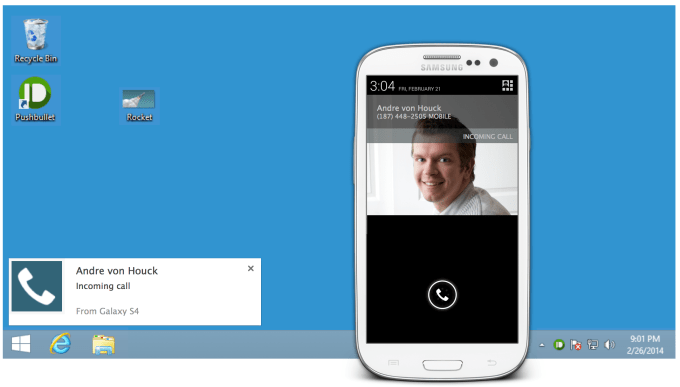
 CodeCombat – A Multiplayer Game That Teaches Programming
CodeCombat – A Multiplayer Game That Teaches Programming
Everyone wants to learn to code, but nobody wants to “complete lessons,” especially kids. But CodeCombat has baked programming education into a classic swords ‘n’ magic role-play game. Players write JavaScript to beat levels, and can even compete and code along with friends. The final levels are hard enough that only top engineering talent can win. Soon, CodeCombat will release 10 level sets for four more programming languages. The games are free to play, and CodeCombat makes money by pointing recruiters towards players who’ve proven they’re great programmers. By getting more people code-savvy and helping companies win the talent wars, CodeCombat could do good and become a sustainable business. Read more from TechCrunch about CodeCombat.

 Wit.ai – Voice Interface API
Wit.ai – Voice Interface API
Voice is how we’ll control devices too small for a keyboard, like watches, earbuds, and much of the “Internet Of Things.” But it’s a ton of work for a developer to build their own voice system, with natural language processing, speech recognition, and other engineering requirements. So Wit.ai has created a voice interface API, and developers can pipe into their app to enable voice command. That could let them offer in-app voice search, hardware control without buttons, and more. The co-founder sold his last company to speech tech giant Nuance, and now Wit.ai has 3,000 developer-users like Pebble and Samsung and is growing 29 percent per week. Every app will soon need speech tech, and any startup that can offer an alternative to big providers like Nuance or (maybe) Google will be in a great position for traction or acquisition. Read more from TechCrunch about Wit.ai.

AirHelp: Stick it to the airline 
AirHelp wants to help fliers get compensation that they are legally entitled to after an airline screws up and is late, or cancels their flight. The total dollar amount this sums to each year is $16 billion. And you can go back three years, meaning that there is another $48 billion potentially sitting there.
AirHelp handles the details. You put in your flight number, and if you can get paid, they’ll handle it. The company takes a one-fourth cut if it gets you money back. Not a bad business model unless you are an airline.
MadeSolid: Builds the stuff that goes into 3D printers 
MadeSolid wants to make the materials that go into your 3D printer better. In its view, the better the stuff that you put in, the better the stuff will come out.
The market is reacting well to its products, with its revenue growing at 16 percent per week on products that can have margins up to 80 percent. The company has shipped to more than 20 countries. 3D printing is a growing revolution that is not going away, so making the stuff that the people behind the dials will use isn’t a bad idea.
BellaBeat: Watch the heartbeat of your unborn kid ![]()
BellaBeat is a sensor and app that lets mothers of unborn children track the heartbeat of their child to be and keep an eye on its development. BellaBeat also includes a community for moms to interact and share their kids’ progress.
The device, which costs $129, has margins of a high enough level that the presenting founder was too “ashamed” to admit them. The company sold “thousands” in Europe, and in its first three weeks here in the United States has sold 3,000 units and signed 12 distribution deals. Quantified baby. It’s going to be big.
OneDegree: Yelp For Social Services
This is a nonprofit organization that is seeking to revolutionize the way that people reach social services. It helps low-income families get the help they need by pointing them to the right resources. There are more than 46 million people living under the poverty line today, so this is a big problem seeking a big solution.
The problem for many of these families is that there are too many social services to choose from. There are 6,000 local resources in San Francisco alone, but they all live on paper and are difficult to find on the web or on mobile. One Degree, in contrast, can provide personalized recommendations for services that they’re trying to reach.
Learn more about One Degree on TechCrunch.
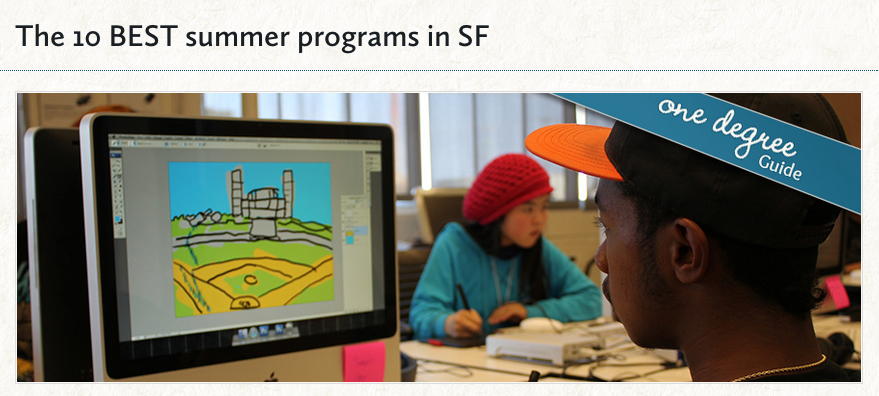
Povio: The Polite Photo Messaging App
This is a messaging app that has already taken over the Slovenian market, and now the team behind it wants to take over the U.S. Unlike other photo messaging apps, which are push-based, Povio requires users to connect via text before they start sending photos.
After becoming bigger than Snapchat in Slovenia, the team came to the U.S. and did a test with students at the University of Santa Clara. It got 1,200 students to sign up, half of which use the app every single day. Now it’s looking to grow that user base on other campuses.
Read more about Povio here.
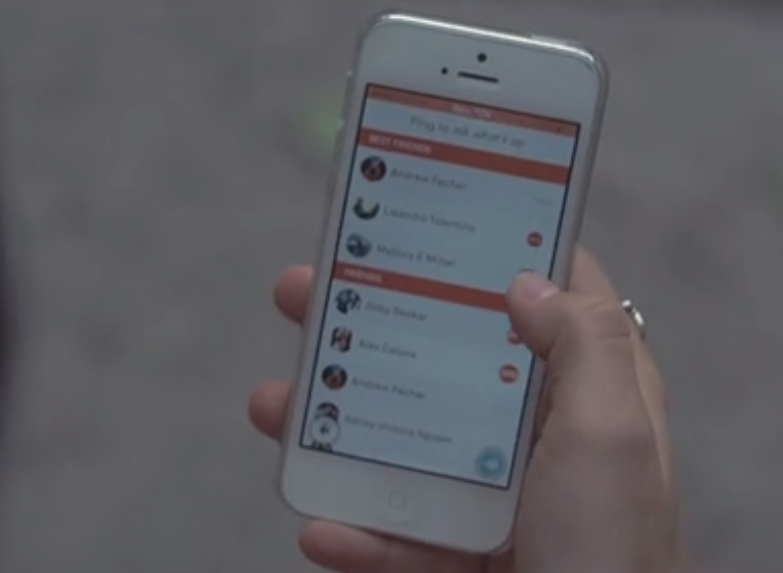
Rickshaw: An API For Deliveries
This startup offers same-day delivery as a service, helping other companies to launch on-demand services without having to deal with all the headaches of running a logistics business. No hiring drivers, scheduling routes, or dealing with customers.
Instead, Rickshaw turns deliveries into an API call. It makes deliveries on behalf of its customers, allowing them to focus on their core business. As it gets more customers, it can be scaled up and offer even better services based on economies of scale. In short, it hopes to do for the offline world what Amazon Web Services did for online services.
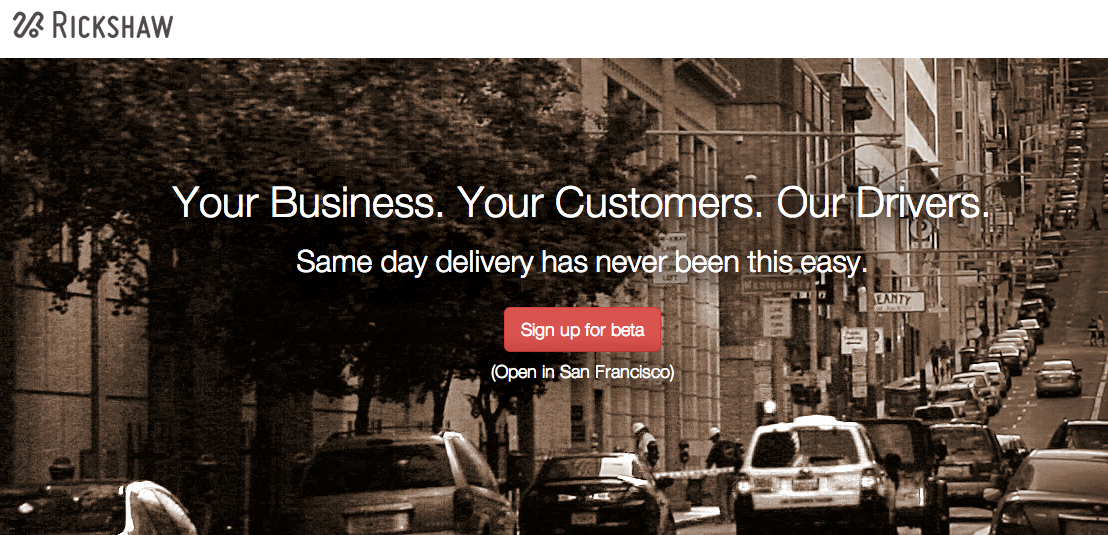
Zidisha: Kiva For Now
Zidisha is a micro-lending platform for developing nations that takes advantage of advances in online marketplaces and the ability to reach small businesses that are seeking funding. Unlike Kiva, which charges high interest rates due to partnering with banks, Zidisha hopes to reach borrowers directly.
 As a result, the platform is able to offer an interest rate of 10 percent versus the 30 percent to 80 percent for other services. It’s already signed up $1.8 million in loans to 5,000 small businesses in Africa and hopes to sign up more.
As a result, the platform is able to offer an interest rate of 10 percent versus the 30 percent to 80 percent for other services. It’s already signed up $1.8 million in loans to 5,000 small businesses in Africa and hopes to sign up more.
Read more about Zidisha on TechCrunch.
 Rocketrip: Rewarding Employees For Saving Money On Business Travel
Rocketrip: Rewarding Employees For Saving Money On Business Travel
Rocketrip is a company that helps businesses to save money on business travel that their employees book. To do so, it provides a platform that estimates the amount of money that employees should spend. It then rewards them by giving gift cards and other perks that are 50 percent of the money they saved.
By doing so, Rocketrip is saving companies that use its platform 24 percent off the travel bills that they would otherwise spend. Customers pay Rocketrip 10 percent of the savings, but it actually makes more money processing rewards for third-party partners.
You can read more on TechCrunch here.
